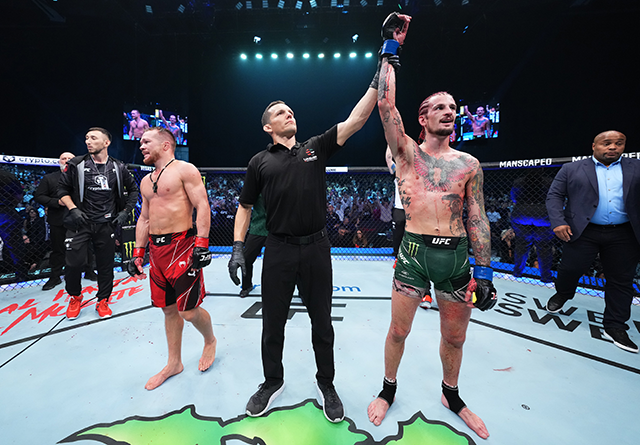The Bottom Line: What Constitutes a Robbery?

Editor’s note: The views and opinions expressed below are those of the author and do not necessarily reflect the views of Sherdog.com, its affiliates and sponsors or its parent company, Evolve Media.
For as long as judges are scoring fights, fans will be complaining about robberies. It is an unavoidable, eternal reality of subjectively judging a competition. In spite of that, we’re no closer to settling what constitutes a robbery. The discussion usually boils down to the pitch of the collective anger more than any accumulation of arguments and facts. That collective anger rose again on Saturday in the case of Sean O’Malley’s split decision win over Petr Yan at UFC 280.
Advertisement
The two judges who scored the fight for O’Malley were also in a decided minority. Only one media score collected at MMAdecisions.com gave the fight to O’Malley. Ben Duffy, John Brannigan and Tudor Leonte at Sherdog.com not only all gave Yan the fight but only gave O’Malley one collective round out of nine. I likewise scored the fight for Yan, giving him the first and second rounds while giving the third to O’Malley. Such unity outside of the judges must constitute a robbery, right? Not so fast. In fact, O’Malley-Yan is a good case study for what is and isn’t a robbery.
There is a tendency for some to associate being in a strong
minority with being a bad scorecard. Certainly, it’s worth looking
into why a judge might score a round a certain way when few others
are scoring it that way. However, there are going to be plenty of
times when the minority viewpoint is held for good reasons. That’s
also going to be more likely when it comes to high-profile fights
like O’Malley-Yan. For some undercard fight on a low-level show, a
judge that scores the fight differently than anyone else might
simply be tired or might not be paying close attention.
O’Malley-Yan, on the other hand, was one of the most anticipated
fights on a major pay-per-view event, and the two judges who scored
it for O’Malley flew long distances from the United Kingdom to be
there. It’s hard to believe their decisions weren’t conscientious
and thoughtful.
Giving thought to a score doesn’t necessarily make it right, of course. Sometimes, judges just aren’t evaluating what they’re seeing very well. To give one classic example we’ve seen in MMA over the years, there were periods where judges uneducated on the ground game would give rounds to the fighter on top even when he spent the vast majority of the round defending submissions from the fighter on the bottom. Luckily, that doesn’t happen as often now, but it was a typical example of bad judge scoring.
Another example that often comes up in both MMA and boxing—one that is less likely to go away over time—is judges scoring for a fighter pushing forward, swinging at air and getting countered effectively by his opponent. Some judges just can’t resist scoring for the fighter walking forward and don’t seem to have a particularly good eye for who is connecting and who isn’t. One fighter will land more, land harder, do more damage and still lose the round on the scorecards. That’s another prime example of bad judging.
This was not the case with O’Malley and Yan. Pretty much everyone seems to agree Yan won Round 2 convincingly. The question of whether there was something wrong with scoring the fight for O’Malley comes down to whether it was fair to give him Rounds 1 and 3. In each case, both men landed strong strikes. O’Malley landed more significant strikes in both rounds, but his margin was wider in third round, where he bloodied Yan and landed more total strikes, as well. The equalizer from Yan’s standpoint was his takedowns and control time, but in neither the first nor the third rounds did he do much damage or threaten with submissions on the ground.
Few seem to have any problem with O’Malley being given the third. The first round was much closer when it came to the striking. If you throw out Yan’s takedown in the first, you still might give it to him based on the standup. Thus, the takedown likely played a big role as a sort of tie breaker in a very close fight. That’s why fighters often go for a takedown at the end of a close standup round even if they have no time to capitalize on it; it’s a way to give the judges something distinct to point to in the scoring to distinguish one fighter from the other.
In not allowing a minute of not particularly effective control time to sway them in an otherwise razor-thin margin of difference in the round, the judges were making a justifiable judgment for taking what ended up being the minority view. They did not have the commentary talking about takedowns, but there is no way they weren’t aware of the basic dynamic. This was a close round contested mostly on the feet, and one fighter also had a takedown and minute of control tempting the judges to vote his way. They weren’t persuaded, and not being persuaded by a development that wasn’t that offensively impactful anyway is precisely the sort of reasonable judgment we want judges to make. Few may have joined the judges in that conclusion, but this was no robbery and reflective of the type of scoring we want to see when judges go against the grain.
« Previous Beneil Dariush: ‘It Was A Bummer’ to See Volkanovski Targeted for Next LW Title Shot
Next 5 Defining Moments: Arnold Allen »
More




 UFC News & Features
UFC News & Features


